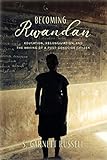Becoming Rwandan : Education, Reconciliation, and the Making of a Post-Genocide Citizen / S. Garnett Russell.
Material type: TextSeries: Genocide, Political Violence, Human RightsPublisher: New Brunswick, NJ : Rutgers University Press, [2019]Copyright date: ©2020Description: 1 online resource (250 p.) : 23 b-w imagesContent type:
TextSeries: Genocide, Political Violence, Human RightsPublisher: New Brunswick, NJ : Rutgers University Press, [2019]Copyright date: ©2020Description: 1 online resource (250 p.) : 23 b-w imagesContent type: - 9781978802872
- 9781978802902
- Citizenship -- Rwanda
- Education and state -- Rwanda
- Education -- Social aspects -- Rwanda
- Genocide -- Rwanda -- History -- 20th century
- Peace-building -- Rwanda
- Reconciliation
- Transitional justice -- Rwanda
- Transitional Justice
- Bilanz
- Bildung
- Bildungspolitik
- Erziehung
- Friedenserziehung
- Konflikt
- Nation
- Versöhnung
- Auswirkung
- Ergebnis
- Friedenskonsolidierung
- EDUCATION / General
- Rwanda, Rwandan, genocide, political violence, human rights, education, post-genocide, government, Rwandan government, peace, unification, patriotism, citizenship, reconciliation, teachers, students, global models, school, peacebuilding, state-building, limitations of education, intergroup conflict, Rwandan genocide
- 379.67571 23
- LC95.R87 R87 2019
- online - DeGruyter
| Item type | Current library | Call number | URL | Status | Notes | Barcode | |
|---|---|---|---|---|---|---|---|
 eBook
eBook
|
Biblioteca "Angelicum" Pont. Univ. S.Tommaso d'Aquino Nuvola online | online - DeGruyter (Browse shelf(Opens below)) | Online access | Not for loan (Accesso limitato) | Accesso per gli utenti autorizzati / Access for authorized users | (dgr)9781978802902 |
Frontmatter -- Contents -- List of Abbreviations -- 1. Introduction -- 2. The Role of Education in Transitional Justice, Peacebuilding, and Reconciliation -- 3. Constructing Citizenship and a Post-Genocide Identity -- 4. Using and Abusing Human Rights Norms -- 5. Addressing the Genocide and Promoting Reconciliation -- 6. The Potential and Limitations of Education for Peacebuilding -- Appendix A: Research Methods and Data Analysis -- Appendix B: National Policy Documents, Curricula, and Textbooks -- Acknowledgments -- Notes -- References -- Index
restricted access online access with authorization star
http://purl.org/coar/access_right/c_16ec
In the aftermath of the genocide, the Rwandan government has attempted to use the education system in order to sustain peace and shape a new generation of Rwandans. Their hope is to create a generation focused on a unified and patriotic future rather than the ethnically divisive past. Yet, the government’s efforts to manipulate global models around citizenship, human rights, and reconciliation to serve its national goals have had mixed results, with new tensions emerging across social groups. Becoming Rwandan argues that although the Rwandan government utilizes global discourses in national policy documents, the way in which teachers and students engage with these global models distorts the intention of the government, resulting in unintended consequences and undermining a sustainable peace.
Mode of access: Internet via World Wide Web.
In English.
Description based on online resource; title from PDF title page (publisher's Web site, viewed 27. Jan 2023)


